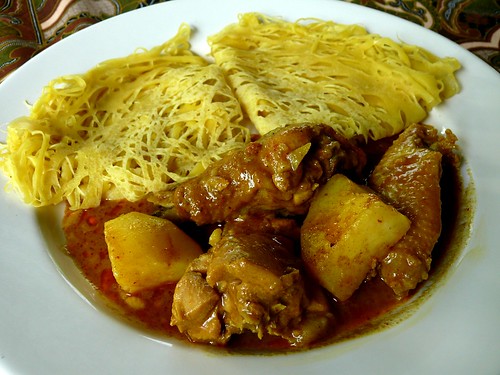General Statistics
14% of the Singapore’s population is Malays who are also the 2nd largest ethnic group in Singapore. The majority of the Malays are descendants from Malaysia, Indonesia and even Singapore. Most of them are Muslims while the minorities are Christians and Buddhists.
Language
Many Malays in Singapore do not speak the language of their ancestors from Indonesia. They speak “Bahasa Melayu” (Malay Language) which originates from Malaysia. English is also widely spoken and Arabic amongst Muslim religious teachers during Islamic lessons.
Malay, now being one of the four main languages in Singapore was the national language spoken by the indigenous Singaporean Malays. It is also spoken by over 30 million people worldwide. The language is also used to sing the National Anthem written by Zubir Said.
Religion

The majority of the Malays are Muslims. Therefore, they practice Islam. Thus, the Malays in Singapore do not consume pork or alcohol. They only consume foods that are certified as ‘halal’. The word originates from Saudi Arabia which means permitted according to the law of Islam.

The Muslim Malays are also dressed modestly. The female wear the ‘tudung’ (headgear) and cover all their body parts except for their faces, hands and feet. The men wear the ‘songkok’ which is usually worn during prayers or festivals (scroll down for more information).
The Malay also pray 5 times a day, fast from sunrise to sunset during the Ramadan (the 9th month in the Islamic Calender).
Clothing
For Malay women, they wear the baju kurung; Malay men wear the baju melayu with a songkok on the head. Alternatively, the men wear batik shirts with trousers.


Food
The most popular dish amongst the Malays is the ‘Nasi Lemak’- Coconut Rice Meal. This is cooked in coconut milk with Sambal Ikan Bilis- fried anchovies cooked in dry chili shrimp sauce garnished with cucumber slices, roasted peanuts and fried egg. It is packaged in a small banana leaf and is usually eaten as breakfast.


Satay is also very famous in Singapore. It is barbequed meat on sticks served with spiced sweet peanut sauce for dipping. Ketupat, a Malay rice cake is also an accompaniment to Satay.






Other dishes such as Beef Rendang (Malay Spiced Coconut eef), Sambal Udang (Spicy Prawns), Laksa (Noodles in Tangy Fish Soup), Roti Jala (‘Net’ Bread or Crepe, Apam Balih (peanut pancake) and Otah (Malay Fish Mousse) are simply amazing and are must tries!
Way of Greeting

Malays of the same gender shake hands as Muslim men do not touch women in public. ‘Salaam’ is often used as greeting. This is an Arabic word, meaning peace. Thus, when they greet, they pray for each other to have peace. The younger Malays ‘Salaam’ and kiss the hands of the Elders (usually of the same gender) to show deep respect.
Wedding

| |||||||
. | |||||||
Names
Many Malays do not have surnames. Instead, men add their father's name to their own name with the term "bin" (meaning ‘son of’). So Rosli bin Suleiman, would be Rosli the son of Suleiman.
• Women use the term "binti", so Aysha bint Suleiman is Aysha the daughter of Suleiman.
Gift Giving Etiquette

o If invited to someone's home for dinner, bring the hostess pastries or good quality chocolates.
o Never give alcohol.
o Do not give toy dogs or pigs to children.
o Do not give anything made of pigskin.
o Avoid white wrapping paper as it symbolizes death and mourning.
o Avoid yellow wrapping paper, as it is the color of royalty.
o If you give food, it must be “halal” (meaning permissible for Muslims).
o Offer gifts with the right hand only or both hands if the item is large.
o Gifts are generally not opened when received.
Festivals
Hari Raya Haji is a religious festival celebrated by Muslims worldwide as a commemoration of Ibrahim‘s (Abraham‘s) willingness to sacrifice his son Ismail forAllah. It is one of two Qur’anic Eid festivals that Muslims celebrate.

Hari Raya Haji is the 10th day of the month of Zul Hijjah of the lunar Islamic calendar. The festivities sometimes last for two to three days more depending on the country. It is the day after the pilgrims in Hajj, the annual pilgrimage to Mecca in Saudi Arabia by Muslims worldwide, descend from Mount Arafat.

Muslims who can afford to do so sacrifice their best domestic animals (usually sheep, but also camels, cows, and goats) as a symbol of Ibrahim’s (Abraham’s) sacrifice. The sacrificed animals, called korban, have to meet certain age and quality standards or else the animal is considered an unacceptable sacrifice. Generally, these must be at least a year old, and weigh 165 kg.
Hari Raya Puasa

Hari Raya Puasa is a time to give in charity to those in need, and celebrate with family and friends the completion of a month of blessings and joy.

Before the day of Hari Raya Puasa, during the last few days of Ramadan, each Malay family gives a determined amount as a donation to the poor. This donation is of actual food -- rice, barley, dates, rice, etc. -- to ensure that the needy can have a holiday meal and participate in the celebration

On the day of Hari Raya Puasa, Malays gather early in the morning in outdoor locations or mosques to perform the Hari Raya Puasa prayer. This consists of a sermon followed by a short congregational prayer.
After the Hari Raya Puasa prayer, Malays usually scatter to visit various family and friends, give gifts (especially to children), and make phone calls to distant relatives to give well-wishes for the holiday. ‘Duit Raya’(small packets of money) are also given to children and youths. These activities traditionally continue for three days.







No comments:
Post a Comment